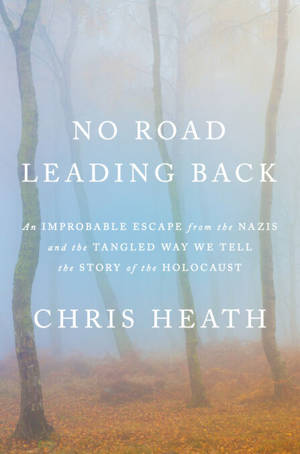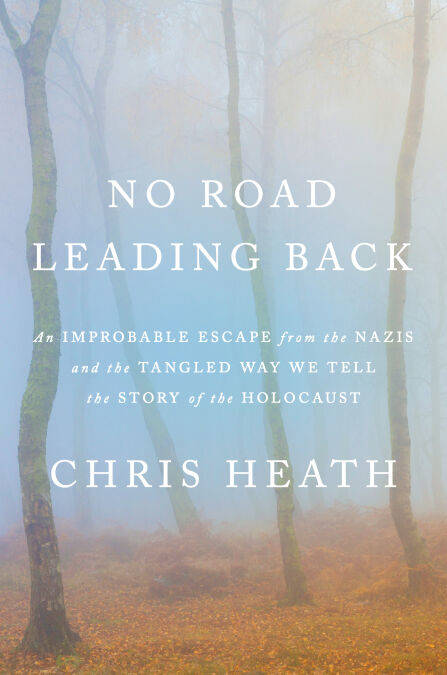
Bedankt voor het vertrouwen het afgelopen jaar! Om jou te bedanken bieden we GRATIS verzending (in België) aan op alles gedurende de hele maand januari.
- Afhalen na 1 uur in een winkel met voorraad
- In januari gratis thuislevering in België
- Ruim aanbod met 7 miljoen producten
Bedankt voor het vertrouwen het afgelopen jaar! Om jou te bedanken bieden we GRATIS verzending (in België) aan op alles gedurende de hele maand januari.
- Afhalen na 1 uur in een winkel met voorraad
- In januari gratis thuislevering in België
- Ruim aanbod met 7 miljoen producten
Zoeken
No Road Leading Back E-BOOK
An Improbable Escape from the Nazis and the Tangled Way We Tell the Story of theHolocaust
Chris Heath
E-book | Engels
€ 6,93
+ 6 punten
Uitvoering
Omschrijving
A WASHINGTON POST BEST BOOK OF THE YEAR • NATIONAL JEWISH BOOK AWARD FINALIST • CHAUTAUQUA PRIZE FINALIST • This by turns shattering and hope-giving account of prisoners who dug their way to freedom from the Nazis is both a stunning escape narrative and an object lesson in the ways we remember and continually forget the particulars of the Holocaust.
No Road Leading Back is the remarkable story of a dozen prisoners who escaped from the site where more than 70,000 Jews were shot in the Lithuanian forest of Ponar after the Nazi invasion of Eastern Europe in 1941. Anxious to hide the incriminating evidence of the murders, the S.S. later in the war enslaved a group of Jews to exhume every one of the bodies and incinerate them all in a months-long labor—an episode whose specifics are staggering and disturbing, even within the context of the Holocaust.
From within that dire circumstance emerges the improbable escape made by some of the men, who dug a tunnel with bare hands and spoons while they were trapped and guarded day and night—an act not just of bravery and desperation but of awesome imagination. Based on first-person accounts of the escapees and on each scrap of evidence that has been documented, repressed, or amplified since, this book resurrects their lives, while also providing a complex, urgent analysis of why their story has rarely been told, and never accurately. Heath explores the cultural use and misuse of Holocaust testimony and the need for us to face it—and all uncomfortable historical truths—with honesty and accuracy.
No Road Leading Back is the remarkable story of a dozen prisoners who escaped from the site where more than 70,000 Jews were shot in the Lithuanian forest of Ponar after the Nazi invasion of Eastern Europe in 1941. Anxious to hide the incriminating evidence of the murders, the S.S. later in the war enslaved a group of Jews to exhume every one of the bodies and incinerate them all in a months-long labor—an episode whose specifics are staggering and disturbing, even within the context of the Holocaust.
From within that dire circumstance emerges the improbable escape made by some of the men, who dug a tunnel with bare hands and spoons while they were trapped and guarded day and night—an act not just of bravery and desperation but of awesome imagination. Based on first-person accounts of the escapees and on each scrap of evidence that has been documented, repressed, or amplified since, this book resurrects their lives, while also providing a complex, urgent analysis of why their story has rarely been told, and never accurately. Heath explores the cultural use and misuse of Holocaust testimony and the need for us to face it—and all uncomfortable historical truths—with honesty and accuracy.
Specificaties
Betrokkenen
- Auteur(s):
- Uitgeverij:
Inhoud
- Aantal bladzijden:
- 640
- Taal:
- Engels
Eigenschappen
- Productcode (EAN):
- 9780805243727
- Verschijningsdatum:
- 2/09/2024
- Uitvoering:
- E-book
- Beveiligd met:
- Adobe DRM
- Formaat:
- ePub

Alleen bij Standaard Boekhandel
+ 6 punten op je klantenkaart van Standaard Boekhandel
Beoordelingen
We publiceren alleen reviews die voldoen aan de voorwaarden voor reviews. Bekijk onze voorwaarden voor reviews.









